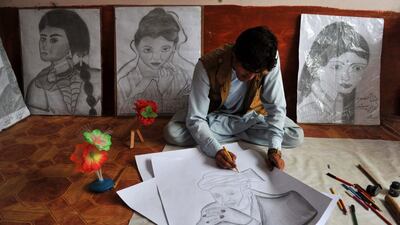KABUL // Afghanistan’s presidential election is headed for a run-off, but allegations of fraud and rumours of backroom deals are fuelling uncertainty about what could happen next.
With full preliminary results from the April 5 election now released, the former foreign minister Abdullah Abdullah leads with 44.9 per cent of the vote, followed by the former World Bank economist Ashraf Ghani with 31.5 per cent, the Independent Election Commission (IEC) said on Saturday. The six other candidates trail far behind.
Mr Abdullah and Mr Ghani have both served in the government of the outgoing president, Hamid Karzai, who is constitutionally barred from seeking a third term in office.
Although both men stood unsuccessfully against Mr Karzai in the 2009 presidential election, they have pledged to keep him closely involved in any future administration.
The final official result is set to be announced on May 14 after a period for adjudication of hundreds of complaints over alleged fraud.
The head of the election commission, Ahmad Yusuf Nuristani, said the run-off would be held on June 7.
The close race has already triggered rumours of intense back room meetings between politicians and warlords, who are all seeking to play a decisive role in shaping the next administration.
While there is still a sense of relief among many Afghans that the election went relatively smoothly, there is also a fear that cracks in the democratic process will widen the longer the situation drags on.
This concern was recently voiced by Humaira Haqmal, a civil society activist who had once been due to run in the election as a vice presidential candidate before the IEC cut the number of candidates.
She said the vote itself “went very well” and showed that Afghans “only want a democratic regime”.
Now, though, she is worried that a period of political turmoil could unfold in the months ahead.
“Some of the candidates have already distributed guns to local areas in the country,” Ms Haqmal said. “They are threatening the government and warning the people that if the election’s final result is not to their benefit they will make Afghanistan return to the challenges of [the early 1990s].”
The doubts starting to creep into conversations about the election are a far cry from the early optimism expressed by many Afghans.
Despite heavy rain and threats from the Taliban, long queues of people waiting to vote were found across Kabul on April 5. Turnout nationwide was initially estimated at around 60 per cent – far higher than predicted.
At a polling station in the capital one man who had just cast his ballot told The National he was determined to take part even if it cost him his life.
Soon afterwards the US president Barack Obama released a statement describing the election as “critical to securing Afghanistan’s democratic future”.
However, not everything went as well as originally portrayed in international and local media.
Insurgent attacks occurred in many places, even if they were not the high-profile assaults that had been expected.
In some rural areas people also complained that Afghan military operations to drive out rebels before April 5 had left them trapped in their villages, unable to leave for weeks as the country went into lockdown.
Meanwhile, reports of fraud, intimidation and ballot-box stuffing have gathered momentum.
Haji Zalmai Tareen, a 35-year-old university student, claimed he had seen men on polling day offering residents in the Bagrami district of Kabul 1,000 Afganis (Dh62) to vote for Mr Abdullah.
“There were some people who were trying to buy the election,” he said.
Mr Nuristani said the preliminary results were from a total of 6,892,816 votes counted. He said the election commission was also examining ballots from 444 polling stations – potentially representing more than 200,000 votes – because of fraud concerns.
The delay in deciding Mr Karzai's successor will frustrate the US, which wants to conclude a long-term security agreement with Afghanistan as soon as possible.
All foreign troops could leave at the end of this year unless the deal, known as the Bilateral Security Agreement, is signed. The Afghan economy has already begun to falter amid the political and militarily uncertainty.
Mr Abdullah and Mr Ghani, who have both pledged to sign the BSA if elected, have been meeting some of the other candidates from the first round in an effort to swing the run-off vote in their favour.
There has also been talk that they could form a coalition government – an idea they have publicly rejected.
One other possibility being discussed in Kabul is that a temporary administration be established.
Even before the election there were rumours this could happen and that speculation has only increased with the return to Afghanistan of Abdul Sattar Sirat, a prominent Afghan figure who is ordinarily based abroad and is known as an ally of the former monarchy.
He recently told reporters in Kabul that an interim government may need to be set-up to avert a political crisis.
foreign.desk@thenational.ae

